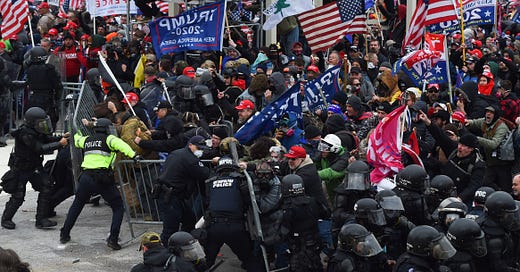1. Epilogue or Prologue?
We will be discussing the events of January 6, 2021 for a long time. There are many aspects to consider. Many strings that need pulling. But there is one overriding question that should be the lens through which we consider all else:
Was January 6 the last gasp or a harbinger?
Every other consideration needs to be made in light of that question. Keep it at the front of your mind as you evaluate American politics for the foreseeable future. It should animate all of our thinking.
I’m not going to lie: This is the question I’ve been turning over in my head for almost two years. My contention has been, all along, that the liberal order is weaker than most people understand. That it must be tended, nurtured, and defended.
Ask yourself this: How different would January 6 have been had Republicans held majorities in both the Senate and the House? How different would it have been had Trump won the popular vote, but lost the Electoral College?
Our democracy is only as stable as we make it. Together.
2. Removal From Office
Over the last 18 hours, across the political spectrum, there has been recognition that Donald Trump is a clear and present danger to our constitutional order. The prudent course of action is to remove him from office as soon as possible and to then initiate procedures which prevent him from seeking office again.
Notably, even some Republicans and conservatives who have been anti-anti-Trump, or Trump skeptical, have come to this conclusion and called for Trump’s removal.
I have a question for these people: If elected Republicans do not act to attempt to remove Trump from office, then should the Republican party be supported going forward?
Let’s look at this question through our primary lens: Was January 6 epilogue or prologue?
The answer, of course, is that we can’t know. All we can do is act in such a way as to attempt to make it the epilogue.
And one way to do that is to oppose any political party that has a significant faction which is literally in favor of authoritarianism.
Here is what we know about the Republican party as constituted today:
A Republican president incited the January 6 insurrection.
This Republican president continues to poison our politics by lying about the results of the 2020 election.
Roughly half of this party’s Congressional delegation voted last night—even after the attack on the Capitol—to overturn a free and fair election.
There is no reasonable way to conclude that the Republican party, as currently configured, is not substantially in favor of authoritarianism.
It should follow that if the Republican party does not act to remove Trump from office, then anyone who today says that Trump should be removed from office should then take a semi-permanent position of opposition to the Republican party.
Because if they do not, then they are making it more likely that what we saw yesterday is the beginning, and not the end.
3. The French Village
One of the ongoing questions is what to do with the various levels of people who promoted and collaborated in the movement that created yesterday’s insurrection.
On the one hand, it is nice to see Mick Mulvaney et al. resign in protest.
That’s better than staying and actively defending Trump, I guess. But is it enough? What are we supposed to do with people like Mulvaney, who collaborate for years and then jump ship at the last minute?
We’re seeing moves like this from political actors of various statures. Here’s one that struck me last night:

For those who don’t know, the “Reagan Battalion” is an anonymous online collective. They began as anti-Trump, then switched to anti-anti-Trump, and finally became pro-Trump. For the last couple years they savaged people like me for warning about where this was all headed. All from the comfort of their anonymous Twitter account.
And then, last night, they issued this one-tweet apology. Is that enough? What should be required of them?
They say that “the only way” Republicans can redeem themselves is by removing Trump. So if Republicans do not remove Trump, then shouldn’t the Reagan Battalion devote itself to opposing the Republican party?
And if they don’t—if they keep arguing on behalf of the Republican party, even if they maintain that they only like the “good” Republicans—then what does that mean?
I’ve had an ongoing conversation about this question with Sarah Longwell on our Secret Podcast. (Which you can listen to by becoming a member of Bulwark+)
Sarah has been watching A French Village, the 2009 show about a small community in France living through the German occupation of the Second World War. Some of the villagers resist. Some try to get along. Some actively collaborate. Toward the end of the series it becomes clear that the Allies are closing in and the Germans will leave. At which point the villagers start grappling with how they’re all going to live together after the war.
There are gradations of culpability. The people who fled to the woods as part of the resistance are easy enough to re-integrate. And the villagers know what to do with those who joined the Nazis.
But what about the people who stayed in the village and kept their heads down as the Germans killed their neighbors? What about the baker who joined the citizen council to work with the Germans, but slipped extra rations to the people who needed them and looked the other way on resistance actions every once in a while? The baker probably thought he could do more good working from the inside. But he also, by total coincidence, got a nice house and extra wine out of the deal.
What should the villagers do with the baker?
That is, roughly speaking, our question.
There have been different levels of complicity over the last four years from Josh Hawley, the Schlapps, and Tim Scott to the assorted surrogates, partisans, and media enablers.
What do we do with them?
In each case, our answer should be forward looking: Are they continuing to enable the party of authoritarianism, or are they fighting against it?
That’s because anyone who recognizes Trump’s attempted coup must grapple with the fact that this putsch—even after the sacking of the United States Capitol—was supported by the majority of elected Republicans in Congress. They are the authoritarian party.
These are now the stakes in American politics. And that is the test going forward.
The line has been drawn and everyone must choose a side.







